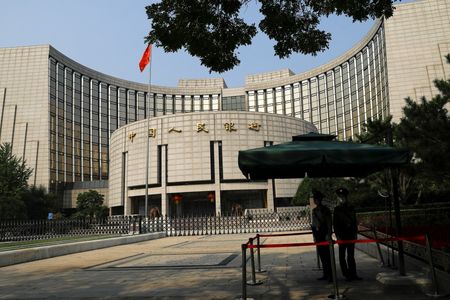By Ella Cao and Kevin Yao
BEIJING (Reuters) – China’s new yuan loans likely slumped in October from September, a Reuters poll showed, as stringent curbs to stamp out COVID-19 outbreaks and a property sector debt crisis hurt economic activity and credit demand.
Chinese banks are estimated to have issued 800 billion yuan($110.4 billion) in net new yuan loans last month, falling sharply from 2.47 trillion yuan in September, according to the median estimate in the survey of 27 economists.
That would be lower than the 826.2 billion yuan issued in the same month a year earlier.
“While policymakers continued to focus on providing credit support to the manufacturing sector, and PBOC also net injected liquidity through the Pledged Supplementary Lending (PSL) in October, overall credit demand might have remained sluggish amid weaker overall activity growth,” analysts at Goldman Sachs said in a research note.
In October, the People’s Bank of China made 154.3 billion yuan in loans to three policy banks via its PSL facility, central bank data showed.
China’s economy saw a faster-than-expected rebound in the third quarter, but its growth prospects have been hobbled by a recurrence of COVID outbreaks, with lockdowns hurting factory and consumer activity. Falling home sales have also deepened a liquidity crunch among indebted property developers.
China’s factory activity unexpectedly fell while its exports and imports also contracted in October, the first simultaneous slump since May 2020.
The People’s Bank of China has pledged to keep policy accommodative to support growth, but it faces limited room due to concerns over capital flight and a weakening yuan.
The central bank governor has pledged to maintain normal monetary policy and positive interest rates for as long as possible, projecting that China’s potential economic growth is likely to stay within a reasonable range.
China is on track to miss its annual growth target of around 5.5% – the latest Reuters poll forecast 2022 growth at 3.2%.
Outstanding yuan loans were expected to grow by 11.2% in October from a year earlier, unchanged from September, the poll showed. Broad M2 money supply growth in October was seen at 12.0%, versus 12.1% in September.
China’s local governments issued a net 24.1 billion yuan in special bonds in September, the finance ministry has said, down from 51.6 billion yuan in August.
Any slowdown in government bond issuance could weigh on total social financing (TSF), a broad measure of credit and liquidity. Growth of outstanding TSF quickened to 10.6% in September from 10.5% in August.
In October, TSF is expected to drop to 1.6 trillion yuan from 3.53 trillion yuan in September.
($1 = 7.2480 Chinese yuan)
(Editing by Jacqueline Wong)

